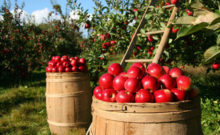Image Source: Flickr/smith
More and more organic food products are popping up on the shelves of grocery stores, often with a higher price tag than the conventional food products they compete with. Organic food benefits are varied, but they include reduced exposure to pesticides, enhanced nutritional value, and the support of sustainable agricultural practices.
The Benefits of Organics
As author Robyn O’Brien explains on The Huffington Post, recent studies suggest a variety of benefits for people eating organic food. Different types of organic food help benefit in a variety of ways, some of which stem from the decreased exposure to chemical pesticides, a stronger immune system, better sleep, decreased risk of cancer and heart disease, weight loss, increased antioxidant consumption, and benefits to brain health, particularly in developing children. Some studies suggest that organically raised crops have higher nutritional value.
Organic Fruits and Vegetables
Even with all of these organic health benefits, many customers will balk at the price of organic fruits and vegetables. If a consumer must pick and choose between what organic produce to spend the extra money on, the Environmental Working Group updates its “Dirty Dozen” list annually, which lists the produce items likely to have the most pesticide residue, and should be purchased organically. Topping this year’s list of highest pesticide levels include apples, celery, and bell peppers.
Organic Meat Products
Like other organic food, the benefits of organic meat products is at least partially related to decreased presence of chemicals in the animal fat (including DDT, PCBs, dioxin and pesticides.) Additionally, many people who believe that organic food help benefit are also interested in environmental benefits of organic meat production, including a more humane treatment of animals, the use of organic manure as organic fertilizer, and sustainable livestock practices.
Environmental Benefits
Organic food benefits not only the world’s consumers, but also the environment and the health of farmers as well. Organic practices are often considered more sustainable than large-scale operations and decrease ground water and air contamination from pesticides. Organic production processes benefit farmers as well because they are not forced to handle herbicides, pesticides, and chemical fertilizers that can threaten their health or, in the case of pregnant workers, the health of unborn children.
The Organic Label
So how can consumers know what’s officially organic? The United States Department of Agriculture (USDA) has specific labeling requirements when it comes to certified organic food products. With very few exceptions, if a product is not certified, it cannot use the label “organic” on its packaging. The USDA does allow packages to use the “made with” organic label if at least 70 percent of the product’s ingredients are organic. Read carefully, because “all natural” is not the same as “organic”.
Organic food does come at a higher cost, but many of its proponents believe the cost of consuming non-organic fruits, vegetables, meats and dairy products is far greater. Whether a customer is looking to improve his or her personal health or the health of the larger farming industry, organic products provide an important alternative.




